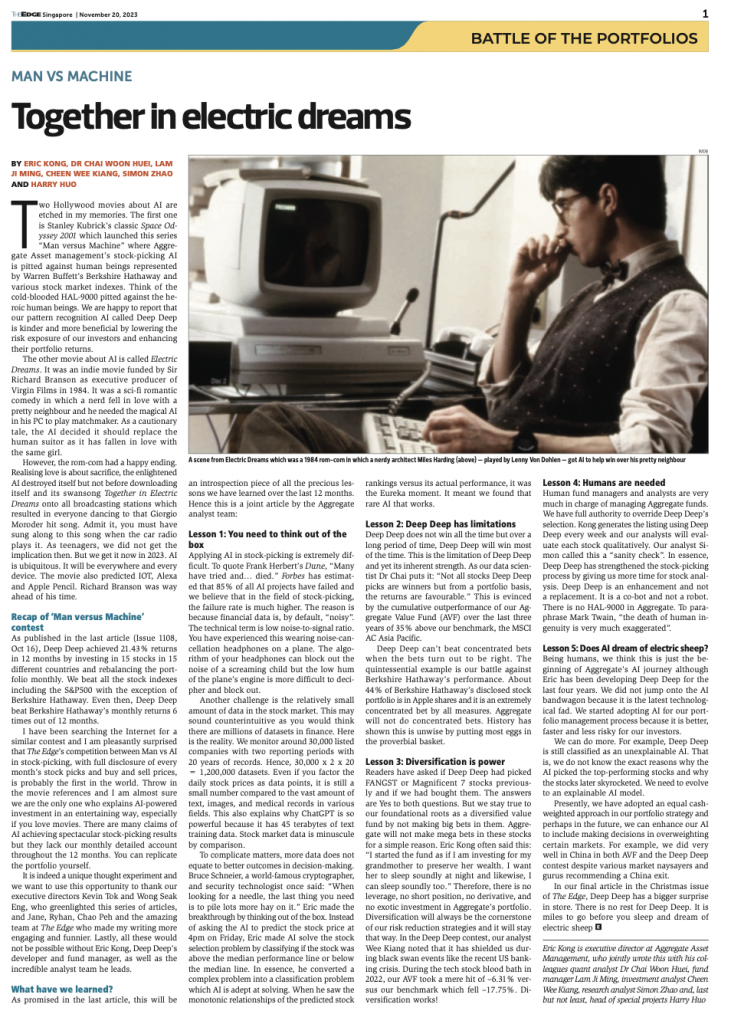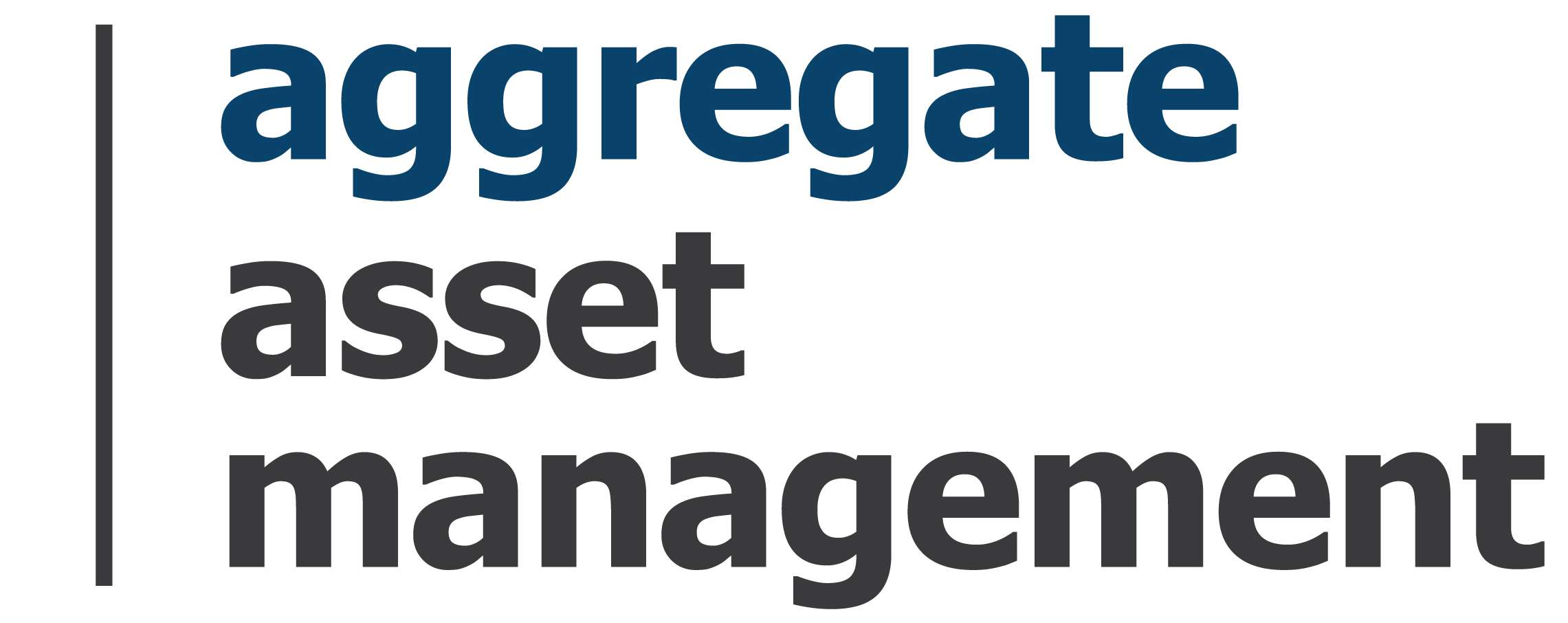Two Hollywood movies about AI are etched in my memories. The first one is Stanley Kubrick’s classic Space Odyssey 2001 which launched this series “Man versus Machine” where Aggregate Asset management’s stock-picking AI is pitted against human beings represented by Warren Buffett’s Berkshire Hathaway and various stock market indexes. Think of the cold-blooded HAL-9000 pitted against the heroic human beings. We are happy to report that our pattern recognition AI called Deep Deep is kinder and more beneficial by lowering the risk exposure of our investors and enhancing their portfolio returns.
The other movie about AI is called Electric Dreams. It was an indie movie funded by Sir Richard Branson as executive producer of Virgin Films in 1984. It was a sci-fi romantic comedy in which a nerd fell in love with a pretty neighbour and he needed the magical AI in his PC to play matchmaker. As a cautionary tale, the AI decided it should replace the human suitor as it has fallen in love with the same girl.
However, the rom-com had a happy ending. Realising love is about sacrifice, the enlightened AI destroyed itself but not before downloading itself and its swansong Together in Electric Dreams onto all broadcasting stations which resulted in everyone dancing to that Giorgio Moroder hit song. Admit it, you must have sung along to this song when the car radio plays it. As teenagers, we did not get the implication then. But we get it now in 2023. AI is ubiquitous. It will be everywhere and every device. The movie also predicted IOT, Alexa and Apple Pencil. Richard Branson was way ahead of his time.
Recap of ‘Man versus Machine’ contest
As published in the last article (Issue 1108, Oct 16), Deep Deep achieved 21.43% returns in 12 months by investing in 15 stocks in 15 different countries and rebalancing the portfolio monthly. We beat all the stock indexes including the S&P500 with the exception of Berkshire Hathaway. Even then, Deep Deep beat Berkshire Hathaway’s monthly returns 6 times out of 12 months.
I have been searching the Internet for a similar contest and I am pleasantly surprised that The Edge Singapore’s competition between Man vs AI in stock-picking, with full disclosure of every month’s stock picks and buy and sell prices, is probably the first in the world. Throw in the movie references and I am almost sure we are the only one who explains AI-powered investment in an entertaining way, especially if you love movies. There are many claims of AI achieving spectacular stock-picking results but they lack our monthly detailed account throughout the 12 months. You can replicate the portfolio yourself. It is indeed a unique thought experiment and we want to use this opportunity to thank our executive directors Kevin Tok and Wong Seak Eng, who greenlighted this series of articles, and Jane, Ryhan, Chao Peh and the amazing team at The Edge who made my writing more engaging and funnier. Lastly, all these would not be possible without Eric Kong, Deep Deep’s developer and fund manager, as well as the incredible analyst team he leads.
What have we learned?
As promised in the last article, this will be an introspection piece of all the precious lessons we have learned over the last 12 months. Hence this is a joint article by the Aggregate analyst team:
Lesson 1: You need to think out of the box
Applying AI in stock-picking is extremely difficult. To quote Frank Herbert’s Dune, “Many have tried and… died.” Forbes has estimated that 85% of all AI projects have failed and we believe that in the field of stock-picking, the failure rate is much higher. The reason is because financial data is, by default, “noisy”. The technical term is low noise-to-signal ratio. You have experienced this wearing noise-cancellation headphones on a plane. The algorithm of your headphones can block out the noise of a screaming child but the low hum of the plane’s engine is more difficult to decipher and block out.
Another challenge is the relatively small amount of data in the stock market. This may sound counterintuitive as you would think there are millions of datasets in finance. Here is the reality. We monitor around 30,000 listed companies with two reporting periods with 20 years of records. Hence, 30,000 x 2 x 20 = 1,200,000 datasets. Even if you factor the daily stock prices as data points, it is still a small number compared to the vast amount of text, images, and medical records in various fields. This also explains why ChatGPT is so powerful because it has 45 terabytes of text training data. Stock market data is minuscule by comparison.
To complicate matters, more data does not equate to better outcomes in decision-making. Bruce Schneier, a world-famous cryptographer, and security technologist once said: “When looking for a needle, the last thing you need is to pile lots more hay on it.” Eric made the breakthrough by thinking out of the box. Instead of asking the AI to predict the stock price at 4pm on Friday, Eric made AI solve the stock selection problem by classifying if the stock was above the median performance line or below the median line. In essence, he converted a complex problem into a classification problem which AI is adept at solving. When he saw the monotonic relationships of the predicted stock rankings versus its actual performance, it was the Eureka moment. It meant we found that rare AI that works.
Lesson 2: Deep Deep has limitations
Deep Deep does not win all the time but over a long period of time, Deep Deep will win most of the time. This is the limitation of Deep Deep and yet its inherent strength. As our data scientist Dr Chai puts it: “Not all stocks Deep Deep picks are winners but from a portfolio basis, the returns are favourable.” This is evinced by the cumulative outperformance of our Aggregate Value Fund (AVF) over the last three years of 35% above our benchmark, the MSCI AC Asia Pacific.
Deep Deep can’t beat concentrated bets when the bets turn out to be right. The quintessential example is our battle against Berkshire Hathaway’s performance. About 44% of Berkshire Hathaway’s disclosed stock portfolio is in Apple shares and it is an extremely concentrated bet by all measures. Aggregate will not do concentrated bets. History has shown this is unwise by putting most eggs in the proverbial basket.
Lesson 3: Diversification is power
Readers have asked if Deep Deep had picked FANGST or Magnificent 7 stocks previously and if we had bought them. The answers are Yes to both questions. But we stay true to our foundational roots as a diversified value fund by not making big bets in them. Aggregate will not make mega bets in these stocks for a simple reason. Eric Kong often said this: “I started the fund as if I am investing for my grandmother to preserve her wealth. I want her to sleep soundly at night and likewise, I can sleep soundly too.”
Therefore, there is no leverage, no short position, no derivative, and no exotic investment in Aggregate’s portfolio. Diversification will always be the cornerstone of our risk reduction strategies and it will stay that way. In the Deep Deep contest, our analyst Wee Kiang noted that it has shielded us during black swan events like the recent US banking crisis. During the tech stock blood bath in 2022, our AVF took a mere hit of –6.31% versus our benchmark which fell –17.75%. Diversification works!
Lesson 4: Humans are needed
Human fund managers and analysts are very much in charge of managing Aggregate funds. We have full authority to override Deep Deep’s selection. Kong generates the listing using Deep Deep every week and our analysts will evaluate each stock qualitatively. Our analyst Simon called this a “sanity check”. In essence, Deep Deep has strengthened the stock-picking process by giving us more time for stock analysis. Deep Deep is an enhancement and not a replacement. It is a co-bot and not a robot. There is no HAL-9000 in Aggregate. To paraphrase Mark Twain, “the death of human ingenuity is very much exaggerated”.
Lesson 5: Does AI dream of electric sheep?
Being humans, we think this is just the beginning of Aggregate’s AI journey although Eric has been developing Deep Deep for the last four years. We did not jump onto the AI bandwagon because it is the latest technological fad. We started adopting AI for our portfolio management process because it is better, faster and less risky for our investors.
We can do more. For example, Deep Deep is still classified as an unexplainable AI. That is, we do not know the exact reasons why the AI picked the top-performing stocks and why the stocks later skyrocketed. We need to evolve to an explainable AI model.
Presently, we have adopted an equal cash weighted approach in our portfolio strategy and perhaps in the future, we can enhance our AI to include making decisions in overweighting certain markets. For example, we did very well in China in both AVF and the Deep Deep contest despite various market naysayers and gurus recommending a China exit.
In our final article in the Christmas issue of The Edge, Deep Deep has a bigger surprise in store. There is no rest for Deep Deep. It is miles to go before you sleep and dream of electric sheep.
Eric Kong is executive director at Aggregate Asset Management, who jointly wrote this with his colleagues quant analyst Dr Chai Woon Huei, fund manager Lam Ji Ming, investment analyst Cheen Wee Kiang, research analyst Simon Zhao and, last but not least, head of special projects Harry Huo
To view all articles in the Man vs Machine Challenge series, please click here.
This article was published on The Edge Singapore on 16 November, 2023.




